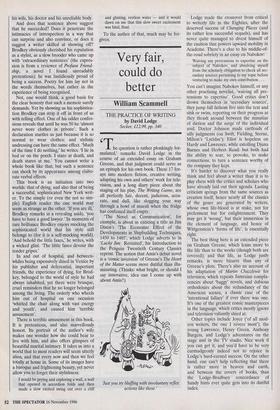Very fair, could do better
William Scammell
THE PRACTICE OF WRITING by David Lodge Seeker, £12.99, pp. 340 The question is rather plonkingly for- mulated,' remarks David Lodge in the course of an extended essay on Graham Greene, and that judgment could serve as an epitaph for his own book. These 17 for- ays into modern fiction, creative writing, adapting his own and others' work for tele- vision, and a long diary piece about the staging of his play, The Writing Game, are all perfectly fair, decent, judicious, accu- rate, and dull, like slogging your way through a bowl of muesli when the fridge has confessed itself empty.
`The Novel as Communication', for example, is about as enticing a title as Jim Dixon's 'The Economic Effect of the Developments in Shipbuilding Techniques, 1450 to 1485', which Lodge adverts to in `Lucky Jim Revisited', his Introduction to the Penguin Twentieth Century Classics reprint. The notion that Amis's debut novel is a 'comic inversion' of Greene's The Heart of the Matter seems more dutiful than illu- minating. (Thinks: what bright, or should I say innovative, idea can I come up with about Amis?) Just you try bluffing with involuntary reflex actions like these.' Lodge made the crossover from critical to writerly life in the Eighties, after the deserved success of Changing Places (and its rather less successful sequels), and has never quite managed to divest himself of the caution that powers upward mobility in Academe. There's a clue to his middle-of- the-road sobriety in an essay on Nabokov:
Waiving any pretensions to expertise on the subject of Nabokov, and absolving myself from the scholarly obligation to check all sec- ondary sources pertaining to my topic before venturing to make my own contribution ...
You can't imagine Nabokov himself, or any other practising novelist, 'waiving all pre- tensions to expertise'. Good critics don't drown themselves in 'secondary sources', they jump full fathom five into the text and sink or swim, reporting on their progress as they thrash around between the minutiae of diction and the surge of the individual soul. Doctor Johnson made cartloads of silly judgments (on Swift, Fielding, Sterne, Milton's lyeidas'); Eliot is hopeless on Hardy and Lawrence, while extolling Djuna Barnes and Herbert Read: but both had the ability to soar, to provoke, to make connections, to turn a sentence worthy of the company they kept.
It's harder to discover what you really think and feel about a writer than it is to play chess with the critics and scholars who have already laid out their agenda. Lasting criticism springs from the same sources as creation itself; hence nearly all the classics of the genre are generated by writers, whose own life-blood is at stake, not for preferment but for enlightenment. They may get it 'wrong', but their immersion in the element of language, and hence of Wittgenstein's 'forms of life', is essentially right.
The best thing here is an extended piece on Graham Greene, which leans more to the life than to the works (though both are covered); and that life, as Lodge justly remarks, is more bizarre than any of Greene's plots. There's also an account of his adaptation of Martin Chuzzlewit for television, which repeats Jamesian compla- cencies about 'baggy' novels, and dubious orthodoxies about the redundancy of the American scenes, a classic case of the `intentional fallacy' if ever there was one. It's one of the greatest comic masterpieces in the language, which critics mostly ignore and television valiantly shied at.
Other topics include Joyce (`of all mod- ern writers, the one I revere most'), the young Lawrence, Henry Green, Anthony Burgess, and Lodge's adventures on the stage and in the TV studio. Nice work if you can get it, and you'd have to be very curmudgeonly indeed not to rejoice in Lodge's hard-earned success. On the other hand, one can't help reflecting that there is rather more in heaven and earth, and between the covers of books, than the Lodge-Bradbury concordance of handy hints ever quite gets into its dutiful index.


















































































 Previous page
Previous page